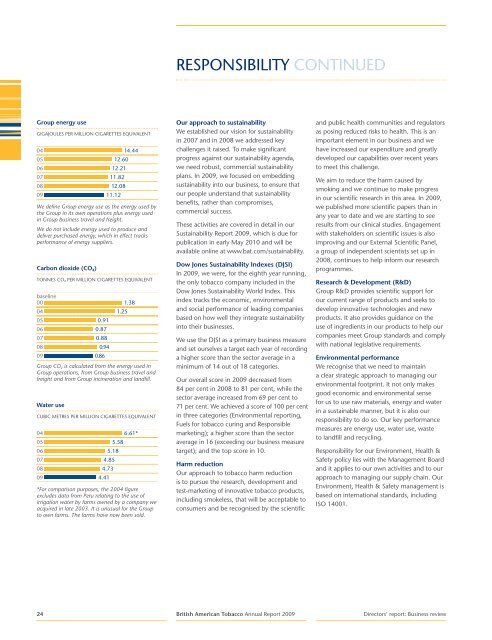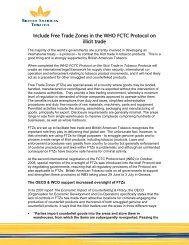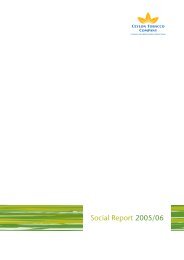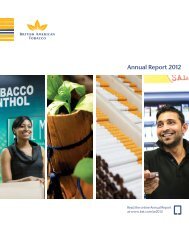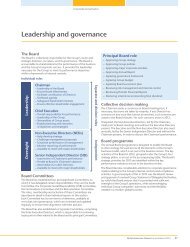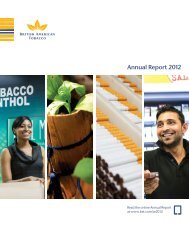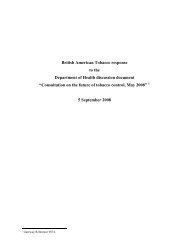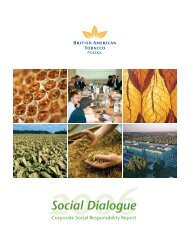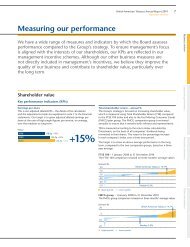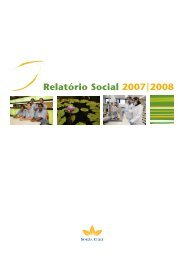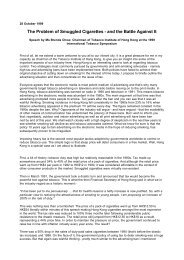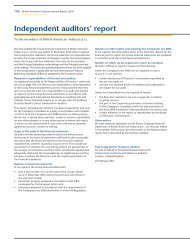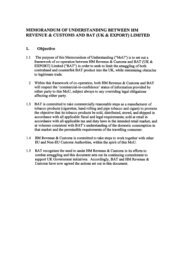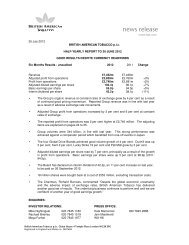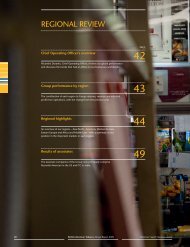Annual Report 2009 - British American Tobacco
Annual Report 2009 - British American Tobacco
Annual Report 2009 - British American Tobacco
Create successful ePaper yourself
Turn your PDF publications into a flip-book with our unique Google optimized e-Paper software.
Group energy use<br />
GIGAJOULES PER MILLION CIGARETTES EQUIVALENT<br />
04 14.44<br />
05 12.60<br />
06 12.21<br />
07 11.82<br />
08 12.08<br />
09 11.12<br />
We define Group energy use as the energy used by<br />
the Group in its own operations plus energy used<br />
in Group business travel and freight.<br />
We do not include energy used to produce and<br />
deliver purchased energy, which in effect tracks<br />
performance of energy suppliers.<br />
Carbon dioxide (CO 2)<br />
TONNES CO 2 PER MILLION CIGARETTES EQUIVALENT<br />
baseline<br />
00<br />
04 1.25<br />
05 0.91<br />
06 0.87<br />
07 0.88<br />
08 0.94<br />
09 0.86<br />
Group CO 2 is calculated from the energy used in<br />
Group operations, from Group business travel and<br />
freight and from Group incineration and landfill.<br />
Water use<br />
CUBIC METRES PER MILLION CIGARETTES EQUIVALENT<br />
04 6.61*<br />
05 5.58<br />
06 5.18<br />
07 4.85<br />
08 4.73<br />
09 4.41<br />
1.38<br />
*For comparison purposes, the 2004 figure<br />
excludes data from Peru relating to the use of<br />
irrigation water by farms owned by a company we<br />
acquired in late 2003. It is unusual for the Group<br />
to own farms. The farms have now been sold.<br />
RESPONSIBILITY CONTINUED<br />
Our approach to sustainability<br />
We established our vision for sustainability<br />
in 2007 and in 2008 we addressed key<br />
challenges it raised. To make significant<br />
progress against our sustainability agenda,<br />
we need robust, commercial sustainability<br />
plans. In <strong>2009</strong>, we focused on embedding<br />
sustainability into our business, to ensure that<br />
our people understand that sustainability<br />
benefits, rather than compromises,<br />
commercial success.<br />
These activities are covered in detail in our<br />
Sustainability <strong>Report</strong> <strong>2009</strong>, which is due for<br />
publication in early May 2010 and will be<br />
available online at www.bat.com/sustainability.<br />
Dow Jones Sustainability Indexes (DJSI)<br />
In <strong>2009</strong>, we were, for the eighth year running,<br />
the only tobacco company included in the<br />
Dow Jones Sustainability World Index. This<br />
index tracks the economic, environmental<br />
and social performance of leading companies<br />
based on how well they integrate sustainability<br />
into their businesses.<br />
We use the DJSI as a primary business measure<br />
and set ourselves a target each year of recording<br />
a higher score than the sector average in a<br />
minimum of 14 out of 18 categories.<br />
Our overall score in <strong>2009</strong> decreased from<br />
84 per cent in 2008 to 81 per cent, while the<br />
sector average increased from 69 per cent to<br />
71 per cent. We achieved a score of 100 per cent<br />
in three categories (Environmental reporting,<br />
Fuels for tobacco curing and Responsible<br />
marketing); a higher score than the sector<br />
average in 16 (exceeding our business measure<br />
target); and the top score in 10.<br />
Harm reduction<br />
Our approach to tobacco harm reduction<br />
is to pursue the research, development and<br />
test-marketing of innovative tobacco products,<br />
including smokeless, that will be acceptable to<br />
consumers and be recognised by the scientific<br />
and public health communities and regulators<br />
as posing reduced risks to health. This is an<br />
important element in our business and we<br />
have increased our expenditure and greatly<br />
developed our capabilities over recent years<br />
to meet this challenge.<br />
We aim to reduce the harm caused by<br />
smoking and we continue to make progress<br />
in our scientific research in this area. In <strong>2009</strong>,<br />
we published more scientific papers than in<br />
any year to date and we are starting to see<br />
results from our clinical studies. Engagement<br />
with stakeholders on scientific issues is also<br />
improving and our External Scientific Panel,<br />
a group of independent scientists set up in<br />
2008, continues to help inform our research<br />
programmes.<br />
Research & Development (R&D)<br />
Group R&D provides scientific support for<br />
our current range of products and seeks to<br />
develop innovative technologies and new<br />
products. It also provides guidance on the<br />
use of ingredients in our products to help our<br />
companies meet Group standards and comply<br />
with national legislative requirements.<br />
Environmental performance<br />
We recognise that we need to maintain<br />
a clear strategic approach to managing our<br />
environmental footprint. It not only makes<br />
good economic and environmental sense<br />
for us to use raw materials, energy and water<br />
in a sustainable manner, but it is also our<br />
responsibility to do so. Our key performance<br />
measures are energy use, water use, waste<br />
to landfill and recycling.<br />
Responsibility for our Environment, Health &<br />
Safety policy lies with the Management Board<br />
and it applies to our own activities and to our<br />
approach to managing our supply chain. Our<br />
Environment, Health & Safety management is<br />
based on international standards, including<br />
ISO 14001.<br />
24 <strong>British</strong> <strong>American</strong> <strong>Tobacco</strong> <strong>Annual</strong> <strong>Report</strong> <strong>2009</strong> Directors’ report: Business review


